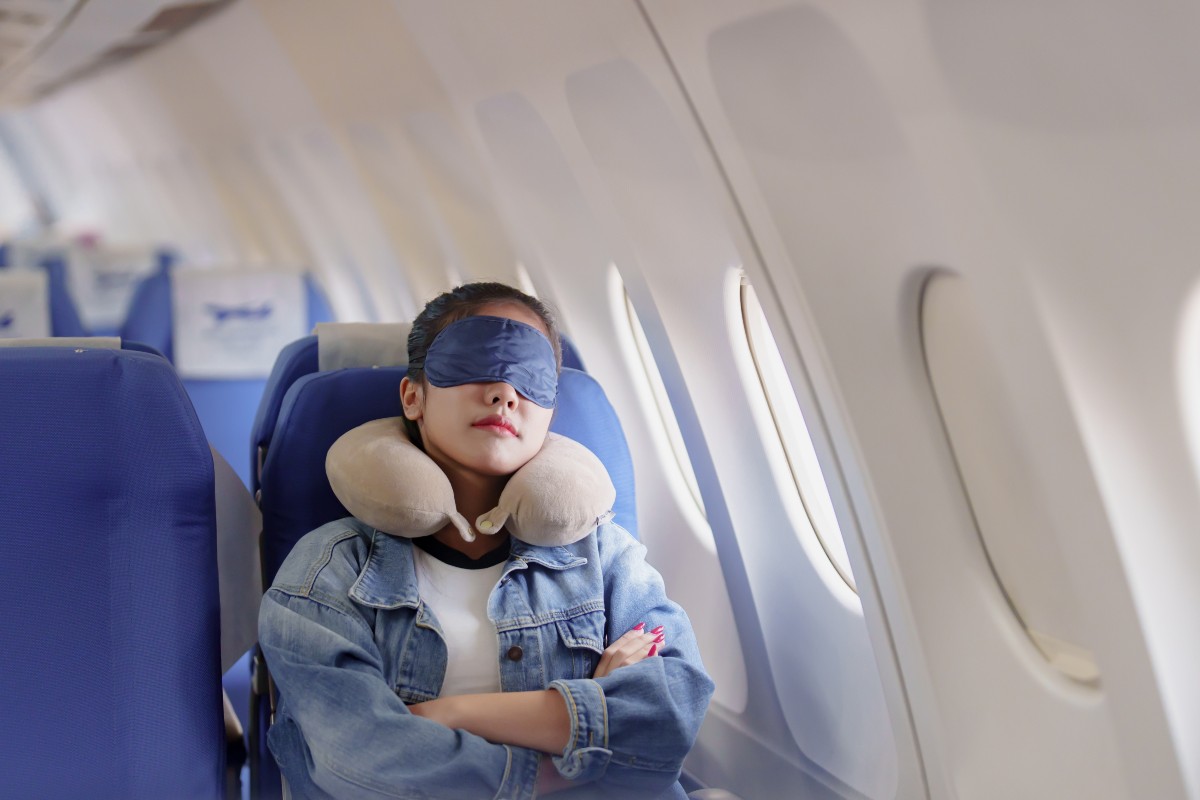
The Golden Travel Rules to Beat Jet Lag this Summer
The summer holidays are just around the corner, and many of us are preparing to jet off around the world. While your sun-soaked holiday to Spain or Greece isn't likely to cause jet lag, millions of Brits take long haul trips every year.
Destinations like Dubai, the Caribbean, and Thailand are some of the most popular, but how can we make sure we arrive well-rested after a long flight, and avoid the dreaded jet lag whilst away?
Well, we like to think we know a little bit about sleeping, even when we’re on the other side of the world. That’s why we’ve asked our resident sleep expert, Dr Sophie Bostock, for some simple advice on how to avoid jet lag and manage sleep issues while travelling, as well as why jet lag symptoms can be so disruptive.
What is jet lag?
According to Dr Sophie, jet lag is simply our bodies trying to adapt to a new time zone.
“Every cell in our body is designed to operate on a 24-hour cycle, based on action during the day and recovery at night. If you fly across multiple time zones, your internal rhythms can’t immediately adjust their timing to fit the new environment, which means that the brain and your organs can become misaligned. This can cause headaches, dizziness, nausea, constipation, memory problems and difficulty sleeping.”
And if you’re wondering why jet lag is worse coming home, it does depend on where you’re flying to, as Dr Sophie explains:
“The saying ‘West is Best, East is a Beast’ refers to the fact that flying West involves delaying or extending your internal clocks to more than 24 hours, whereas flying East involves advancing your internal clock, or shortening your internal day. Flying west may be easier since we naturally extend beyond 24 hours and most people transition more quickly to staying awake for longer vs. going to bed earlier, or flying east.”
We may also find that jet lag is worse when we return because we’re often on our way to doing something fun and exciting. Jet lag may be easier to power through when there are sights to see, places to explore and swimming pools to lounge beside. On the other hand, returning home often means unpacking, going back to work and thinking about what we’re going to have for dinner. All of which are harder when we’re tired.
How to avoid jet lag
However, there are some simple things you can do which can help avoid the jet lag, get over it when it inevitably arrives, as Dr Sophie advises.
Start preparing your body clock two days before you fly
If you’re flying East, the effect on your body clock is to make the day shorter, so you need to become more of an early bird. If you’re flying West, the opposite is true and your day gets longer. That means you need to behave more like a night owl.
Regardless of which way you're going, you should ideally start to prepare at least two days before, so going to bed earlier and getting up earlier, or vice versa.
Change your watch as soon as you get on the flight
One of the simplest ways to help avoid jet lag is to set your watch to reflect the time in your country of arrival, even if it's still hours away. This will help your brain get into the mindset of the new time zone as soon as possible.
Once you’re at your gate and can take a minute to sit down, we recommend making the switch. It’s a small thing but it can be surprisingly effective.
Let the new time zone dictate eating on the flight
Try to stick to the mealtimes you'll have when you get to your destination, and don't spend the whole flight grazing on snacks if you can help it. Like changing your clock, this will help trick your mind into the new time zone and make adjusting easier.
Dr Sophie also notes that it’s best to arrive well-rested, if you can, as this can help beat jet lag. So, if a first-class or even extra legroom ticket isn't an option for you, how can you make a plane journey more sleep-friendly?
Let’s find out.
Tips for sleeping on a plane
And with the easiest way to pass the time on a long haul flight being to sleep, we wanted to leave you with some top expert-backed tips that can help you do just that.
Bring the right equipment with you
A good pair of noise cancelling headphones can really help create a quiet environment, as can ear plugs if you are used to wearing them. It’s also a good idea to pack an eye mask which will help shield your eyes from bright cabin lights. If you’ve forgotten it, a hoody pulled over your eyes or rested over your head will work too.
Flying in comfortable clothing with layers you can easily take off can help with temperature adjustment. Think loose, light clothing. Wearing a hoody and putting the hood up can be a helpful way to shield out the outside world when you’re trying to sleep.
Choose your nap time carefully
The stress of getting to and through the airport on time can sometimes make it hard to fall asleep straight away.
Give yourself time to decompress before you try to sleep, and remember that it will usually be harder to sleep when food and drink services are underway. Post-meal time is usually a good time for a nap, or perhaps even a longer sleep if you can fit it in.
Most airlines wake everyone up with bright lights and extra announcements at least 30 minutes before arrival, so it’s much harder to sleep at that time. If you want to avoid jet lag, try banking some sleep on the plane if you can.
But…
Don’t stay asleep too long, and avoid that in-flight drink!
Short naps of less than 20 minutes are less likely to make you feel ‘groggy’ than longer sleeps of 30 to 80 minutes. If you can sleep for longer than that, you might get a full sleep cycle, which is approximately 90 minutes, and still wake up feeling refreshed.
Alcohol is never a sleep aid. Although it can help with a sedative effect and give the sensation that it helps you fall asleep, the quality of your sleep will be worse, leaving you feeling tired when you arrive. Jet lag can be bad enough, there’s no point making it worse.
Invest in a new bed to beat the jet lag
If you’ve recently got back from a long haul trip or are dreading the thought of climbing into your tired old bed after this year’s summer holiday, why not invest in a new bed and mattress? We can’t promise it will beat the post-holiday blues or make going back to work any easier, but it might just help you get over the jet lag faster.

Gemma Henry - Content Lead
Gemma finds sleep fascinating and describes the discovery aspect of her role as eye-opening. Her keen eye for detail and dedication to thorough research ensures that Bensons customers get the informative sleep-based advice they're looking for.